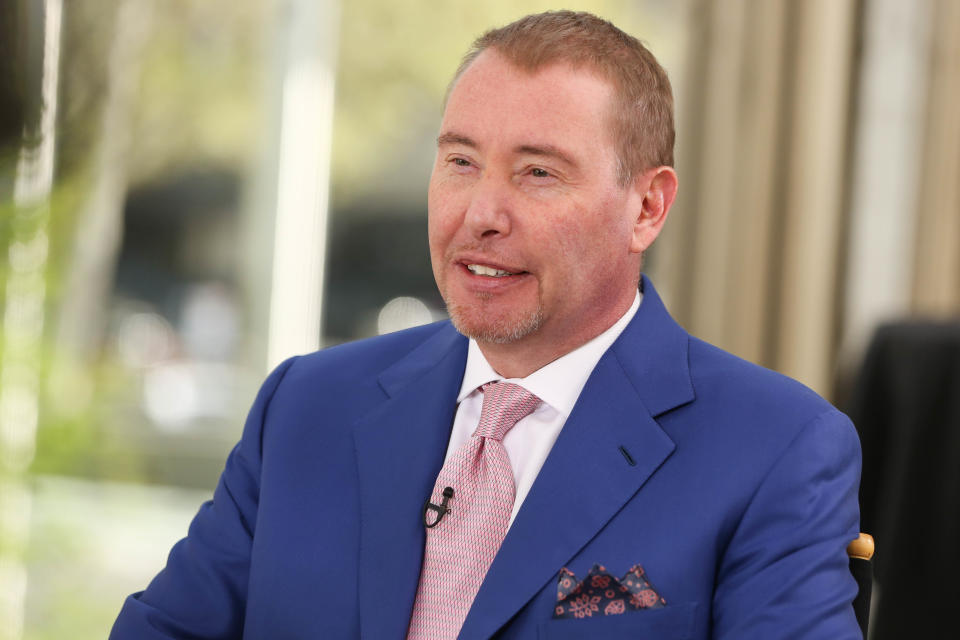DoubleLine's Jeffrey Gundlach puts chance of recession at up to 65%
Prominent bond investor Jeffrey Gundlach, the CEO of $130 billion DoubleLine Capital, sees the increasing likelihood of a recession within the next six to twelve months.
A couple of years ago, Gundlach began highlighting key recession indicators on his webcasts, to see if there was potentially one on the horizon.
"For the first year and a half or so, it was always, 'No. No indication of any coming recession.’ But, now, there are several indicators that suggest a recession could occur within the next year,” Gundlach said on a webcast on Thursday.
While not yet a certainty, the billionaire bond investor noted that the probabilities of the economy moving into the red had moved up. He calculated those chances at around 40 to 45% within the next six months — and 65% in the next year.

Most economists believe the U.S. economy is slowing, but few expect a recession, technically defined as two consecutive quarters of negative growth.
The U.S. Conference Board’s Leading Economic Indicator, a key gauge followed by market watchers, is not forecasting one at present.
Still, Wall Street has been rooting for the Federal Reserve to cut interest rates by sending bond yields plunging, in part to ward off a deep downturn.

In Gundlach’s graphics, the red shaded vertical areas represent recession periods, while the dark blue line is the year-over-year conference board leading economic indicator.
Thus far, the conditions for negative growth have not been met, he said.
"You've never got a recession without the leading indicator touching 0 and going through it. That hasn't happened yet,” Gundlach said.
“In fact, we are not even that close to 0 yet,” he said, adding that “2.7 is the year-over-year reading except our analysis suggests that it's possible that the year-over-year leading indicator does go negative before year end."
He emphasized that DoubleLine is not forecasting that move exactly, but recognizes that it’s a “possibility. So, we’re going to be watching this month by month.”
Race to the bottom in US, Europe
Gundlach proceeded to show the economic data change in the U.S., Europe, and globally, all of which he notes have been “declining pretty steadily.”

DoubleLine’s indicator compares data as it comes out day-by-day for each dataset to its 12-month moving average. It gives a gauge of the momentum of the economy.
According to the picture painted by DoubleLine’s data, the global economy has been performing “below trend consistently for over a year, and so that is clearly not showing signs of robust health,” Gundlach said.
For the billionaire, the indicator that’s “the most concerning” is the U.S. Conference Board Consumer Expectations Less Current Situation. That particular data set compares the current consumer views of the strength of the economy, compared to their view of how the economy will be in the future.

Currently, that data represents a stark “sea of red ink” that’s developing a “warning sign” that the economy is heading toward recession.
And, when the red area starts reversing that usually happens inline with the front edge of a recession.
“But this is really worth watching, [and] if this trend continues it would be due to the view of the present deteriorating and that would be a really strong recessionary sign,” Gundlach said.
“So it's for this reason that I think we do have a potential for recession that's not insignificant in the next six months,” he added.
Julia La Roche is a finance reporter at Yahoo Finance. Follow her on Twitter.
Gundlach: Last year’s market sell-off was just a taste of things to come
Kyle Bass: Hong Kong’s political turmoil sits on a ‘financial time bomb’
Walmart U.S. CEO vows to keep 'the lowest prices we can' amid tariff wars
Follow Yahoo Finance on Twitter, Facebook, Instagram, Flipboard, SmartNews, LinkedIn, YouTube, and reddit.

 Yahoo Finance
Yahoo Finance 
